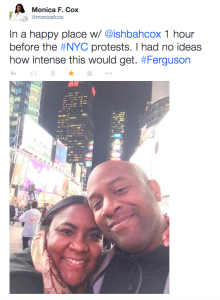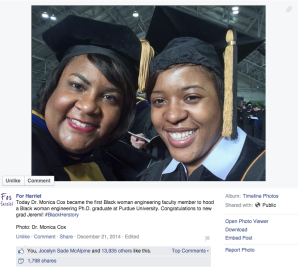5 Secrets to Rocking Social Media Like a Celebrity
During my five month sabbatical, I was mentored by social media entrepreneur. During these months, I’ve observed almost all of his social media interactions, critiqued as many of his social media posts as possible, and read the interactions written by his adoring fans. In a little over a year, I have grown my Twitter followers from 250 to almost 2500 people. Of course, this is a long way from his 110,000 Twitter followers and his 120,000 Facebook followers, but I am slowly but surely on my way to becoming a public intellectual like astrophysicist Neil deGrasse Tyson!
As a professor, I never thought about engaging extensively with people outside of the academy, especially virtually. My primary method for disseminating information to date has been in journals or at disciplinary conferences. This means that my research findings are most likely to reach those who possess Ph.D.s or have access to the wealth of knowledge found in college classrooms and libraries.
Although I love adding to the body of knowledge in my field and being a professor in the academy, I realized almost a year ago that I was overlooking a group of people who I might never meet on my college campus (i.e., people who live in remote areas or those who have no interest conversing with a Ph.D. holder, a professor, or an engineer). To accomplish my research dissemination and STEM advocacy goals, I decided to step up my social media game. These efforts have resulted in new opportunities and in my connection to communities that I might never find in my Indiana community.

Below are some of the biggest lessons that I’ve learned about social media. Although I can’t guarantee that these tips will garner you a verified Twitter account (look it up!), I can guarantee that these tips are some of the best ones that you will get for free.
(1) Make people want to be you or do what you do.
Yes, this sounds vain and absolutely terrible, but it works. People often want what they don’t have, and they love to live vicariously through others (think self-efficacy theory). If you don’t believe me, look at the number of people watching The Real Housewives of Atlanta or Keeping Up with the Kardashians. Many people sit on the edges of their seats measuring how similar or how different their lives are to those who are labeled celebrities.
Where we get this wrong in science, technology, engineering, or mathematics (STEM) fields is that we present bland facts to the public, or we don’t present anything at all. Remember, a picture of a beaker by itself isn’t sexy, so please don’t put one up when you talk about your research. Also, don’t display a picture of yourself looking tired and crazy. Yes, STEM fields can be difficult, and yes, you may have been working in your lab for 20 hours, BUT we don’t have to look as if we’ve been tortured in our social media posts. Present your most appealing and intriguing self to others, and watch what happens!
(2) Create relatable content.
Although professionals can post links to their research articles or can post pictures at conferences, every post does not have to be professional. Consider starting a blog that presents more than one dimension of your life. If you are married, this might be a picture of you and your partner. If you enjoy outdoor activities, tweet a photo of you before your next half-marathon. Express language about how you are feeling or about your vulnerabilities at that moment (e.g., being nervous or excited). Regardless of how you present this personal content, post something that shows that you are a living, breathing human who experiences positive (and sometimes) negative emotions.

(3) Post consistently.
Like any new practice, consistently posting on social media takes time. Instead of staying glued to your computer or mobile phone or posting on social media during faculty meetings (!), consider using social media management tools such as Hootsuite or Buffer to post at least 5 times a day on Twitter and a minimum of once a day on other social media platforms (e.g., Facebook, Instagram, or LinkedIn). It only takes a few minutes per week to schedule your social media posts across multiple social media sites. This, plus the addition of a Hootsuite or Buffer extension in your browser or an app on your mobile phone, gives you the freedom to read an article and share it immediately with your followers.
(4) Interact with Others.
It’s called social media, not “stalk other people without interacting with them” media. I can’t tell you how many people open social media accounts just to read what everyone else is saying or to catch up on a person’s gossip. If I’m referring to you, STOP being a social media voyeur, and START getting some action. There are so many fascinating, funny, smart people who want to engage in conversations with you.
For Twitter (my favorite social media platform), start by asking questions or by answering questions that others post. If someone contacts you, find ways to engage with that person. Follow general rules of conversation and morality in your interactions (e.g., If you’re single, flirt. If you’re married, don’t.)
Via social media, I’ve “talked” to singer Marsha Ambrosius (Instagram) and been followed by attorney Judy Smith, the “real” Olivia Pope (Twitter)(Side note: At the time of this post, I’m one of her 608 followers!). Since the President of the U.S., university presidents, and almost anyone you can think of is on social media, there is no telling who can learn about your business, research, or most intimate thoughts. Maybe social media will even promote world peace! (Yeah, I’m spreading it on a little thick, but you get my point.)
Believe me when I say that professionals, particularly those in academia, are missing big, humongous opportunities to network when they only choose to network in face-to-face venues. I predict that over the next 20 years, networking as we know it will take place primarily via social media. Why not learn how to do this sooner than later?
(5) Tell a good story.
I love the storytelling aspect of social media. Instead of creating a series of disconnected posts, think about how your posts tell a story about who you are and who you want to be.
For example, I enjoy telling my academic stories to others. I have been a professor for 9 years. My social media family has met my Ph.D. students and my husband. They know that I like to laugh, and they know the values that I hold dear. The story that I want to tell via social media is that I’m a humorous, intelligent woman who is approachable and passionate about STEM. My social media story reflects this.

In conclusion, some people think that I reveal too much via social media. I have decided, however, that in this one life that I’ve been given, my electronic tattoo is going to tell people 200 years from now who I was and how I made a difference in the world. What about you?
BONUS TIP: Determine how much you want to reveal about yourself and who you want to be via social media. One of the gurus of social media is Gary Vaynerchuk. Whether you’re a social media novice or expert, watch any of his engaging videos, and you will be convinced of the power of social media. I love his message so much that I’ve adapted it for an undergraduate e-portfolio course in the Engineering Leadership Minor at Purdue!
—————
If you enjoyed my post, feel free to share it with others. Also check out my other blog posts, and provide your contact information so that we can stay connected. Like me on Facebook, and follow me on Twitter, Instagram, and Pinterest.
